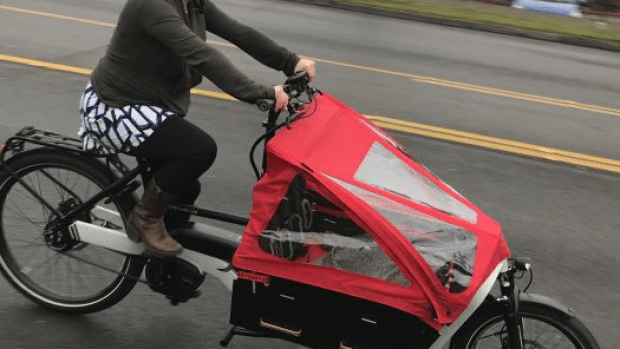France may soon pay its residents to trade their private cars for e-bikes, vehicle-share services, and even transit passes — and the move is re-igniting the conversation about unconventional ways our governments can subsidize the greenest modes of transportation.
In a preliminary vote late last week, the French National Assembly voted to expand its cash-for-clunkers program to include pedal-assist bikes in addition to electric cars, offering erstwhile motorists a grant of €2,500 ($2,975) to buy an electric bicycle if they trade in a gas-powered vehicle at the same time. A spokesperson for the French Federation of Bicycle Users, Olivier Schneider, applauded the government body for actively investing in mobilité territoriales vertueuses —or "virtuous forms of transport," as the French refer to sustainable transportation beyond electric cars — and for recognizing that "the solution is not to make cars greener, but simply to reduce their number."
Residents of Paris may be able to get even more government dollars thanks to an additional €500 subsidy from the regional government, along with a further €400 for city residents, though it's not clear whether they can claim all three grants simultaneously.
Schneider also said that France's program was the first of its kind, but advocates were quick to point out that e-bike subsidies are fast becoming a bona fide global phenomenon. Last summer, Lithuania offered residents up to €1,000 (nearly $1,200) towards the purchase of a similar range of green transportation options if they gave up a gas-powered vehicle, a program that proved so popular that nearly the entire €8 million budget was exhausted in just three months and had to be expanded by another €3 million. Finland's own €1,000 trade-in program has similarly incentivized the purchase of more than 2,000 e-bikes; only half as many electric cars were bought under the same grant. The Scots, meanwhile, can get interest-free government loans towards the purchase of pedal-assist vehicles, and Swedes get a 25-percent rebate. British Columbia has even upped its own e-bike subsidy in recent months.
France (new): trade in your car, get $3k for an ebike
— Asher 🚶🏰🐌🌳🔰🧢 (@AsherDeMontreal) April 12, 2021
US, maybe: keep driving your car, spend $5k on a (toy) ebike, get $1.5k backhttps://t.co/bt86RZjNtx
In the U.S., a handful of states have launched their own programs to encourage residents to ditch their gas-powered rides, but they tend to be more limited in scope. California, for instance, has already expanded its unfortunately named "Clean Cars For All" trade-in program to include up to $7,500 for e-bikes, bikeshare memberships and transit passes, though the government has faced criticism for restricting eligibility to only the lowest-income Californians in a tiny handful of cities, in addition to requiring them to have a car to trade in.
A more expansive federal bill currently under consideration in Congress, the EBIKE Act, would give Americans of all income levels access to a 30-percent tax credit to buy an e-bike, capped at $1,500. The bill has gained support among advocates, though some have pointed out that to get the maximum benefit, a participant in the program would need to spend $3,500 of her own money on a $5,000 cycle — a heavy financial lift that still won't offset the cost of top-of-the-line e-cargo bikes all that much. Others wondered why the program wouldn't cover the entire cost of an e-bike, noting that the structure of the program wound exclude the poorest American residents who disproportionately rely on bikes to get around.
Of course, even the most ambitious government bike subsidies on Earth still pale in comparison to the ways that America subsidizes the purchase and operation of motor vehicles. Even if the whopping $100 billion in consumer rebates for electric cars that Biden is pushing for in his infrastructure plan never come to pass, the existing $7,500 federal tax credit for EVs will probably still stand — as will the billions of dollars of general revenues we transfer to the Highway Trust Fund every year and the billions of free and cheap parking spaces that city residents collectively pay to build and maintain (not to mention the less easily quantifiable ways the nation collectively offsets the high costs of motordom).
But with the average cost of a new car now hovering north of $40,000 a year — more money than 61 percent of Americans make in an entire year — most people still can't really afford to drive. And they go into debt to do anyway, because they have no choice.
Nonetheless, at a Senate Banking committee hearing held on Thursday, multiple lawmakers expressed skepticism about even something as simple as America's long-held practice of diverting 20 percent of gas tax revenues to transit agencies — never mind more proactive programs that would directly subsidize the purchase of green mobility options like electric bicycles and transit passes.
Beth Osborne of Transportation for America, who testified before the panel, expressed surprise at the general tone of the hearing, with some people claiming that "spending gas tax revenues on transit is a wealth transfer, apparently from people who can afford to drive alone to people who can't afford a car" yet no one seem to have any concern "that the general funds put into transportation to cover for drivers not paying their way [is] a wealth transfer from non-drivers to drivers."






